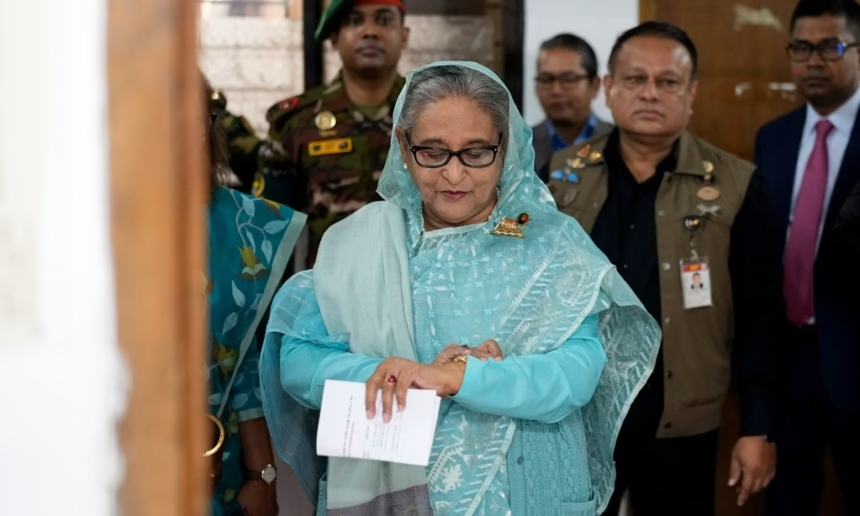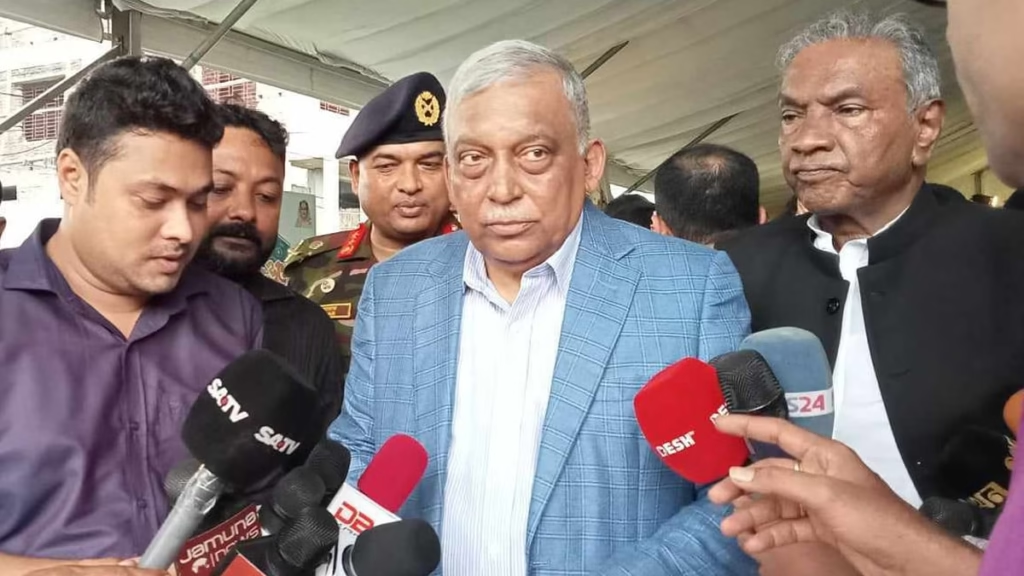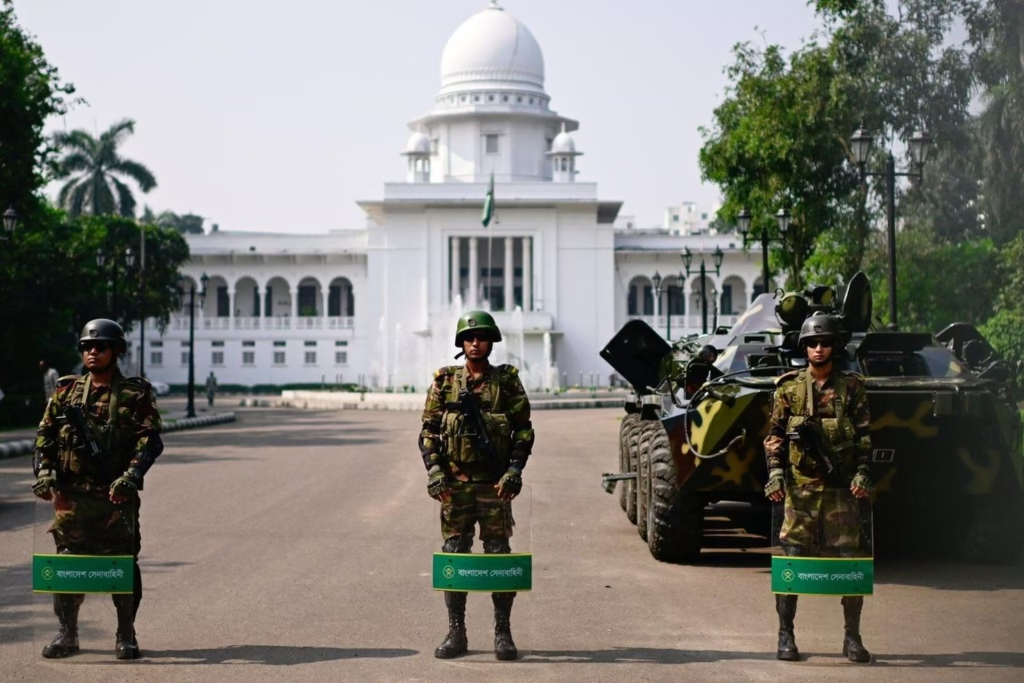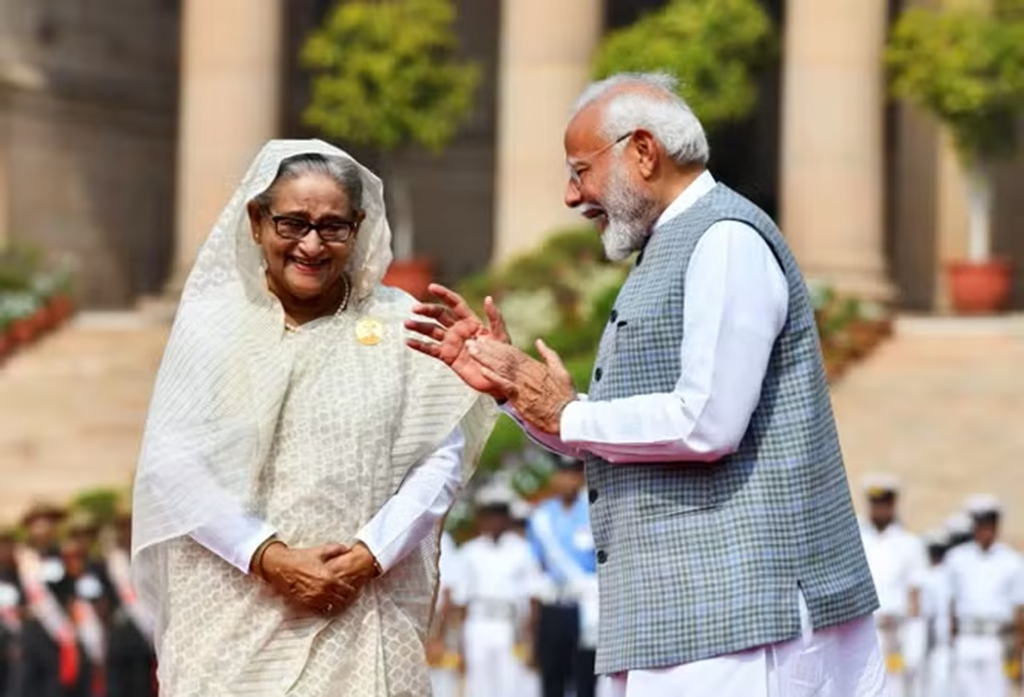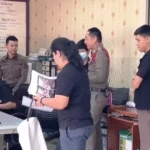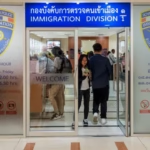NEW DELHI – Bangladesh’s International Crimes Tribunal (ICT) in Dhaka has handed down a death sentence to former Prime Minister Sheikh Hasina, in a ruling that has shaken politics across Southeast Asia.
The 78‑year‑old leader, who has been in India since fleeing after last year’s student uprising, was convicted in absentia on charges of crimes against humanity linked to a deadly crackdown on protesters.
The tribunal found Hasina responsible for a security operation that, according to United Nations estimates, left up to 1,400 people dead. The judgment was broadcast live from a heavily guarded courtroom and quickly sparked strong reactions at home and abroad.
For Bangladesh, still adjusting to life after Hasina’s long rule, the ruling marks a dramatic and tense new chapter. For India, which has hosted her for over a year, it poses serious diplomatic and moral questions.
A three‑judge bench led by Justice Golam Mortuza Mozumder convicted Hasina on several counts, including incitement to murder, issuing direct orders to use lethal force, and failing to stop abuses by security forces.
“The accused prime minister committed crimes against humanity by ordering the use of drones, helicopters, and lethal weapons against civilians,” Justice Mozumder stated, speaking into a silent courtroom that soon erupted into cheers from victims’ families and supporters of the uprising. Outside, Dhaka’s streets were filled with mixed emotions, as celebrations clashed with anger and unease, and security forces stayed on high alert.

From Campus Protest to National Upheaval
The path to this verdict began in the intense summer of 2024, when student protests against Bangladesh’s job quota system spread across the country. Young people first demanded fair, merit‑based recruitment to government jobs. Within weeks, their movement turned into a broader revolt against Hasina’s long and often harsh rule, which critics linked to corruption, rigged elections, and shrinking space for dissent.
Her Awami League government responded with overwhelming force. Security agencies fired live bullets and tear gas into crowds, and helicopters were used to intimidate and attack protest hubs. What started as a policy dispute soon became a national crisis.
During the five‑month trial, prosecutors set out a bleak account of how the state acted under Hasina’s command.
They presented leaked audio clips, which international media outlets verified, in which she allegedly authorised the use of “lethal weapons” to suppress the unrest. Witnesses described scenes in areas such as Chankharpul and Ashulia where unarmed protesters were shot at close range, with bodies reportedly left on the streets as a warning to others.
The United Nations figure of 1,400 dead, mostly from security force gunfire, framed the scale of the case.
“This was not crowd control, it was mass killing,” argued Chief Prosecutor Mohammad Tajul Islam. His team told the court that Hasina was the “mastermind and principal architect” of the violence.
Hasina did not appear in court and was defended by a state‑appointed lawyer. From her base in New Delhi, she issued a five‑page written statement rejecting the entire process. She called the tribunal “biased and politically driven”, accused it of lacking democratic legitimacy, and insisted that, as prime minister, she had acted in “good faith” to restore order during unrest.
Her son, Sajeeb Wazed, condemned the ruling as a “dark day for justice”. Supporters of the former leader argued that she had been targeted to erase her legacy. Many others across Bangladesh, however, saw the outcome as long-awaited.
For them, the verdict brought a sense of release after 15 continuous years of Hasina’s rule, a period that saw strong economic growth and new infrastructure but also deep concerns over autocratic tactics and repeated reports of human rights abuses.
Death Sentence for Former Home Minister
The tribunal did not stop with Hasina. It also delivered a death sentence to her former Home Minister, Asaduzzaman Khan Kamal, accusing him of playing a direct operational role in the crackdown. Khan, a senior Awami League figure and close ally of Hasina, is also believed to be hiding in India.
Judges convicted him on four counts of aiding and abetting killings and failing to prevent murders in locations that featured heavily in the trial, including Chankharpul and Ashulia. The bench issued a single death sentence covering all charges, stating that “his actions and inaction directly contributed to the commission of these crimes”.
While Hasina was portrayed as the political decision‑maker, Khan was described as the man who translated those decisions into orders on the ground. As home minister, he controlled the police, paramilitary units, and key security agencies. Witnesses and documents presented at trial suggested that he approved the use of live ammunition, stun grenades, and other heavy measures that turned protests into scenes of bloodshed.
A third accused, former police chief Chowdhury Abdullah Al‑Mamun, received a five‑year prison sentence after agreeing to cooperate with prosecutors. He admitted guilt, turned state’s witness, and, according to the tribunal, supplied “material evidence” that supported the core findings of the case. The court also ordered financial compensation for families of the dead and injured, seeking at least some relief alongside the harsh punishments.
Khan’s conviction showed that the tribunal was willing to reach beyond the figure of the prime minister and hold accountable those who carried out the orders day to day.
“This is about breaking the machinery of fear built under Hasina,” Prosecutor Islam said after the verdict, praising Bangladesh’s attempt to handle large‑scale abuses while trying to follow international standards.
Debate Over Fairness and the Use of the Death Penalty
Reactions to the ruling split sharply inside Bangladesh and abroad. Human rights groups, including Human Rights Watch and Amnesty International, heavily criticised the ICT. They argued that the court, created by Hasina’s government in 2010 to try suspects of the 1971 war, still did not meet global fair‑trial norms. Their concerns focused on trials in absentia, the speed of proceedings, and the continued use of capital punishment.
The UN Human Rights Office took a mixed stance. It called the decision an important moment for victims who sought accountability, but repeated the UN’s clear opposition to the death penalty in all circumstances. UN spokesperson Ravina Shamdasani raised concerns about possible due process gaps in such a high‑profile case and urged authorities to apply the highest legal safeguards.
The Awami League, now out of power, dismissed the tribunal as a “kangaroo court”. Party leaders claimed that the interim authorities were using the ICT as a political weapon in the run‑up to elections planned for February 2026. In their view, the trial was designed to wipe out the old guard and shape the contest in favour of new forces.
Tensions were already high before the judgment. Dhaka was hit by crude bomb blasts that prompted the government to issue “shoot‑on‑sight” orders in sensitive areas. Activists from the “Red July” movement tried to attack the Dhanmondi home of Sheikh Mujibur Rahman, Hasina’s father and the country’s founding leader. The house, now a museum and symbol of a contested political legacy, has become a flashpoint between rival camps. Police responded with batons and sound grenades to push back the crowds.
Interim head of government Muhammad Yunus, the Nobel Peace Prize‑winning economist, described the verdict as “historic and profound” and called on people to remain calm. His administration, born out of the same uprising that removed Hasina, is under pressure as well. Critics accuse it of its own rights abuses and of failing to contain a rise in Islamist extremism that threatens the fragile transition.
India Under Pressure: Extradition Fight Looms
For New Delhi, the ruling has created an uncomfortable diplomatic challenge. Sheikh Hasina, long seen as a key ally for India, strengthened economic ties, security cooperation, and joint infrastructure projects during her time in office. She has been living on Indian soil since August 2024, when she left Bangladesh by helicopter as protests closed in on her government.
Soon after the verdict, Bangladesh’s Foreign Ministry called on India to hand over both Hasina and Asaduzzaman Khan. It described this as an “obligatory responsibility” and warned that giving them asylum would be “extremely unfriendly” and an insult to justice.
India’s official reaction was guarded. The Ministry of External Affairs said it had “noted” the judgment, repeated India’s support for the people of Bangladesh, and promised to “engage constructively”. Behind that careful wording lies a complex choice.
Commentators in New Delhi point out that Hasina has long been seen as a reliable partner for India in its rivalry with China in the region. At the same time, the interim government of Muhammad Yunus has been seeking closer links with other partners, and diplomatic warmth between Dhaka and New Delhi has cooled.
With Indian general elections approaching, the government faces a difficult balancing act. Sending Hasina back to face the gallows could anger Awami League supporters on both sides of the border and inflame tensions along the shared frontier. Refusing to extradite her or delaying the process could damage ties with Bangladesh and complicate regional security.
Under the tribunal’s rules, Hasina can appeal the verdict only if she surrenders within 30 days. That deadline now hangs over both her and the Indian government.
As Bangladesh moves towards its next election, the death sentence has become both a symbol of accountability and a fresh source of division. For families who filled the Dhaka courtroom in tears, it brought a measure of justice for the estimated 1,400 people who lost their lives during the crackdown.
At the same time, it has stirred fears about deepening political rifts, the role of the military and security forces, and the future of democracy in a country still shaped by the trauma of its 1971 war of independence.
Sheikh Hasina’s dramatic fall from power and subsequent conviction have written a stark new chapter in Bangladesh’s political story. It is a chapter where demands for justice clash with worries about fairness, where old loyalties collide with new realities, and where the eyes of South Asia remain fixed on Dhaka and New Delhi, waiting to see what comes next.





